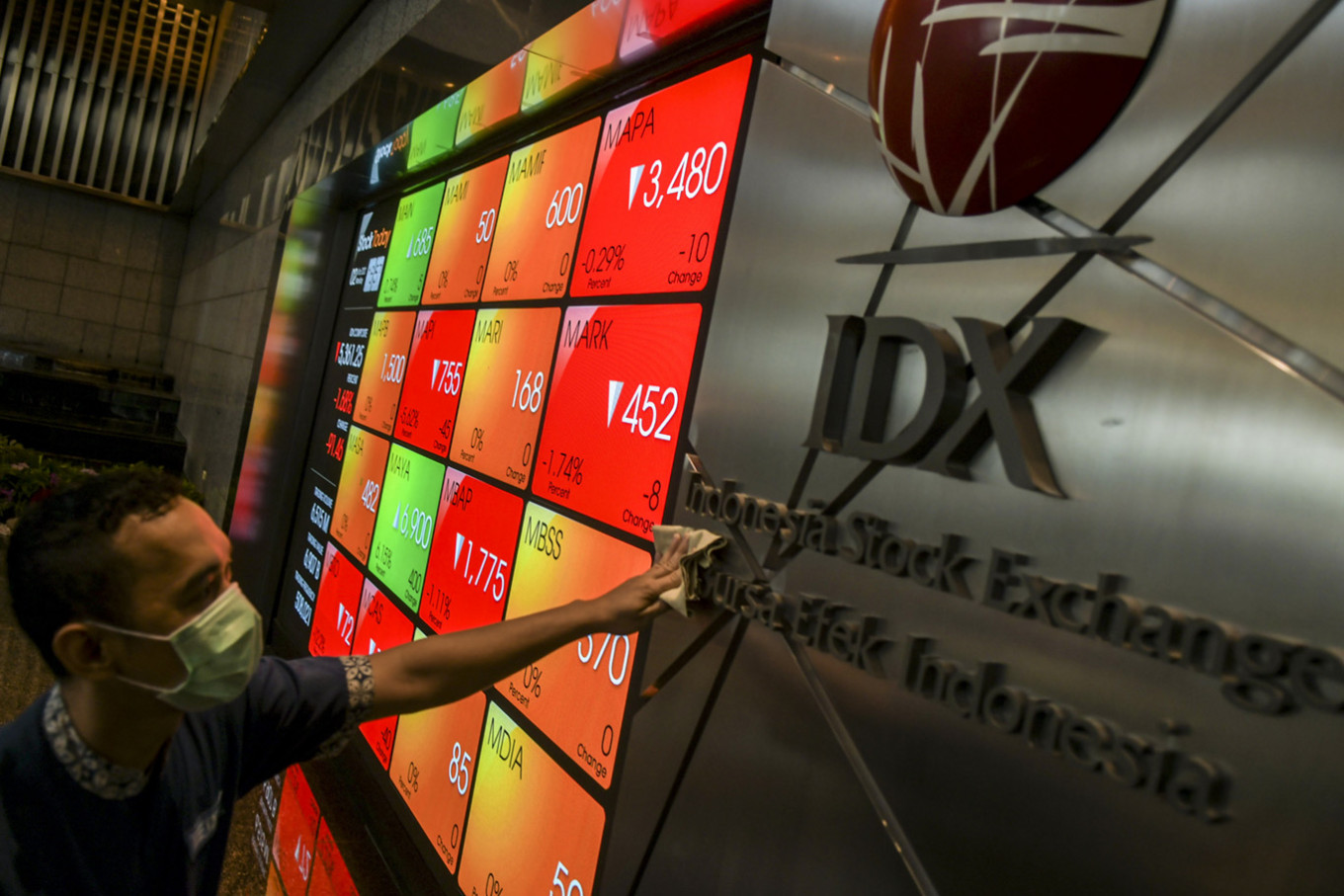Foreign investor selling spree to continue until year-end: Analysts
Change Size
 An employees cleans the Indonesia Stock Exchange (IDX) logo at the bourse's building in Jakarta on March 2. The Indonesian stock market is likely to endure a selling spree by foreign investors until year-end as the global economic and political situations remain unfavorable for the country’s assets amid the prolonged COVID-19 pandemic, analysts have said. (Antara/Galih Pradipta)
An employees cleans the Indonesia Stock Exchange (IDX) logo at the bourse's building in Jakarta on March 2. The Indonesian stock market is likely to endure a selling spree by foreign investors until year-end as the global economic and political situations remain unfavorable for the country’s assets amid the prolonged COVID-19 pandemic, analysts have said. (Antara/Galih Pradipta)
T
he Indonesian stock market is likely to endure a selling spree by foreign investors until year-end as the global economic and political situations remain unfavorable for the country’s assets amid the prolonged COVID-19 pandemic, analysts have said.
Foreign investors at the Indonesia Stock Exchange (IDX) sold almost Rp 32 trillion (US$2.16 billion) of stocks more than they bought as of Monday. In comparison, the local bourse managed to book foreign net buys of Rp 49.19 trillion last year and Rp 50.75 trillion in net selling in 2018, IDX data shows.
“The outlook has yet to become bullish because of the many [global uncertainties] that are not likely to be resolved in the near future,” securities company Artha Sekuritas Indonesia vice president Frederik Rasali told The Jakarta Post on Aug. 31.
Looming risks from the unresolved COVID-19 pandemic have led investors to be more conservative, including by maintaining high levels of cash, he noted.
Fears over the coronavirus outbreak’s economic impact rattled global stock markets, including that of Indonesia, in March and April as investors dumped risky assets and turned to safe-haven assets, such as gold and the United States dollar. The capital outflows weakened the rupiah’s value against the greenback.
The Jakarta Composite Index (JCI), the IDX main gauge, has lost almost 17 percent of its value so far this year as it slipped 0.18 percent to 5,230 on Monday. It fell to its lowest point on March 24 to 3,937.63 due to the virus fear and since then, the index has gained around 32 percent, a rally analysts say was backed by domestic retail investors.
According to the bourse’s data, foreign investors have made up 36 percent of the total value traded on the IDX, at Rp 470.1 trillion, so far this year while domestic investors made up 64 percent, Rp 828 trillion. On Monday alone, foreign investors made up only 19 percent of the total daily trading value, indicating that the trend of declining foreign trading in the IDX continues.
In terms of stock value, foreign investors mostly cashed out from the retail, metal and mining sectors, as well as from the cement industry, Frederik said.
“For the retail and cement sectors so far, it does not look like they will recover in the near future. Meanwhile, the mining sector’s [recovery] will depend on the global prices, especially nickel,” Frederik explained, adding that interest in those sectors was still present, but at relatively low prices.
IDX data revealed that the property, real estate and construction sector was hit the hardest compared with others on the bourse as it fell 41.34 percent as of Monday, followed by miscellaneous industry (down 26.25 percent) and infrastructure, utilities and transportation (down 24.76 percent).
Frederik warned that despite the gain in recent months, the index might experience another decline as long as the real economy had not recovered.
Meanwhile, Bank Negara Indonesia (BNI) Sekuritas research head Kim Kwie Sjamsudin told the Post on Aug. 31 that the return of foreign capital would likely happen after the United States election in November concluded.
“I expect foreign investors will be back to the local market at the end of 2020’s fourth quarter,” Kim said.
Foreign ownership within the Indonesian capital market has gradually decreased over the years, as shown by Indonesian Central Securities Depository (KSEI) data on the growth of total assets listed in C-BEST, an electronic platform to store and complete securities transactions.
Foreign investors' assets accounted for 57.04 percent of the total assets in 2013 while domestic ownership stood at 42.96 percent, according to data presented by University of Indonesia stock market expert Budi Frensidy in a webinar on July 28.
By last year, the foreign ownership fell to 44.29 percent and domestic ownership was at 55.71 percent. The nonresidents’ stake fell further to 41.45 percent as of June this year.
Jasa Utama Capital analyst Chris Apriliony said on Aug. 31 that foreign participation in the bourse was certainly needed if market players wanted the index to rally, adding that a significant foreign capital outflow could weaken the rupiah, depending on whether foreign funds left the country or they merely transferred to other investment instruments, such as bonds.
A document prepared by the Organization for Economic Cooperation and Development (OECD) in June 2020 states that the capital flow dynamics during the COVID-19 crisis appeared to be exceptional in regard to the scale and speed of the outflows, to the extent of exceeding the flows observed in previous crises, including the 2008 global financial crisis.
“The Institute of International Finance [IIF] daily flows tracker estimates that around $103 billion were drawn from emerging market economies between mid-January and mid-May 2020, with equity inflows plummeting first, followed by debt flows,” the document reads.









